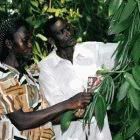Uganda: vanilla growers turn to biofuel crops
 Vanilla farmers in Uganda's Mukono region have embraced the vice president, Prof. Gilbert Bukenya's call to grow and earn big from the Jatropha curcas tree (locally known as 'ekiroowa') with open hands.
Vanilla farmers in Uganda's Mukono region have embraced the vice president, Prof. Gilbert Bukenya's call to grow and earn big from the Jatropha curcas tree (locally known as 'ekiroowa') with open hands.On a recent tour of Mukono, Bukenya urged farmers to exploit the oil bearing shrub. "I was worried about the falling prices for vanilla. However, we can still earn a small income from vanilla and also sell jatropha to boost our earnings," Bukenya told farmers. He added that because of high fuel prices in the world, India has turned to jatropha as an alternative source of fuel. Bukenya, however, did not divulge details of the potential buyers, exporters as well as the price of the crop.
Falling vanilla prices
"My colleagues destroyed their vanilla plantations after the price fell. I am lucky not to have followed their footsteps. I will earn from both the vanilla and jatropha seeds," says Salif Kityo, a farmer in Ngogwe.
Because of a drastic fall in the price of vanilla, many farmers shunned growing the crop, with some even cutting down their plantations out of frustration. But Bukenya discouraged the farmers from destroying their vanilla plantations.
Herbert Kayizi, a farmer in Kyampisi sub-county says: "The extraction of fuel from jatropha is the only good news I have received regarding vanilla this year." Kasasa, a vanilla farmer in Buikwe sub-county urged the Government to ensure that vanilla prices increase again.
Combining crops
A survey by The New Vision showed that over 60% of the farmers who didn't destroy their vanilla plantations are benefiting from jatropha, a drought-tolerant perennial crop:
 biodiesel :: biomass :: bioenergy :: biofuels :: energy :: sustainability :: jatropha :: intercropping :: cash crop :: Uganda ::
biodiesel :: biomass :: bioenergy :: biofuels :: energy :: sustainability :: jatropha :: intercropping :: cash crop :: Uganda :: Research has shown that jatropha, a potential support plant for vanilla, produces seeds with oil content of 37%. The oil can be combusted as fuel without being refined. It produces high quality fuel with similar properties to petroleum. The jatropha seed-oil can also be used as a biodiesel feedstock.
The plant is easy to establish and grows fast, producing seeds that can be harvested for up to 50 years. It also grows well in marginal or poor soils. By-products of the processed seeds include pressed cake, a good organic fertiliser that can also make insecticide.
Mohan distillers, an Indian company which makes biodiesel from jatropha seed, has already expressed interest in establishing a fuel extracting factory in Uganda.
Crop diversification and income security
The example of Uganda's vanilla farmers shows that biofuel crops offer an opportunity to break the dangerous trap which consists of investing in a single cash crop. In the developing world, millions of farmers speculate on planting one crop at a time prices are high, but a collapse of course means a tragedy for these farmers. Intercropping and combining biofuel with non-energy crops, offers a chance for diversification, which spreads the risk.
Those who say biofuel farming in the South will impact the food security of rural populations apparently do not understand this logic. They seem to be unaware of the fact that millions already grow one single non-food crop, aimed at exports. With the profits they earn from it, they buy food. If these farmers invest in biofuel crops and diversify their portfolio, their incomes and thus their food security is increased.
The idea, held by some NGOs who are critical of the biofuels opportunity, that farmers in the South should be self-sufficient food farmers, has no bearing on reality whatsoever. Even in the South, farmers trade their non-food products, and buy food with the profits. Just like in the developed world, they don't have to be farmers who grow their own food. Developing country farmers actively participate on markets and it would be dangerous to represent them as a group of people who should rely on some flawed ideology of autarky - which is what some NGOs are doing.
The vanilla farmers of Uganda - fully connected to the globalised market - are well aware of the biofuels opportunity. It is crucial, however, for them to have more access to market intelligence, so they can refrain from drastically switching from one cash crop (vanilla) to another (jatropha). But one thing is certain: if well informed, developing country cash croppers can benefit from growing biofuel crops, which boost their incomes and consequently their food security.
More information:
New Vision (via AllAfrica): Uganda: Mukono Vanilla Growers Turn to Jatropha - Jan. 23, 2007
 -------------------
-------------------
 Spanish company Ferry Group is to invest €42/US$55.2 million in a project for the production of biomass fuel pellets in Bulgaria.
The 3-year project consists of establishing plantations of paulownia trees near the city of Tran. Paulownia is a fast-growing tree used for the commercial production of fuel pellets.
Spanish company Ferry Group is to invest €42/US$55.2 million in a project for the production of biomass fuel pellets in Bulgaria.
The 3-year project consists of establishing plantations of paulownia trees near the city of Tran. Paulownia is a fast-growing tree used for the commercial production of fuel pellets.









0 Comments:
Post a Comment
Links to this post:
Create a Link
<< Home